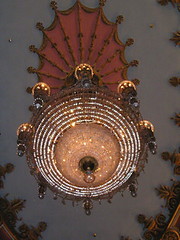
Strand Theater chandelier. Photo by Talbot Hopkins.
Mapping the Unconscious
By CHARLES McGRATH
WHERE SHALL I WANDER
By John Ashbery.
81 pp. HarperCollins Publishers. $22.95.
SELECTED PROSE
By John Ashbery.
Edited by Eugene Richie.
326 pp. University of Michigan Press. $29.95.
John Ashbery is our great poet of the interior landscape -- all the bric-a-brac we carry around in the attic of our minds: imagery, quotations, movie dialogue, advertising jingles, song lyrics, snatches of overheard conversation. He's like Daffy Duck, if that's who the speaker is, in the poem ''Daffy Duck in Hollywood'':
Something strange is creeping across me.
La Celestina has only to warble the first few bars
Of 'I Thought About You' or something mellow from
Amadigi di Gaula for everything -- a mint-condition can
Of Rumford's Baking Powder, a celluloid earring, Speedy
Gonzales, the latest from Helen Topping Miller's fertile
Escritoire, a sheaf of suggestive pix on greige, deckle-edged
Stock -- to come clattering through.
Ashbery has been curating and rearranging this material for so long now -- since 1953, when his first book, ''Turandot and Other Poems,'' came out -- that, almost without our noticing, he himself has become a part of our mental furniture. Once thought to be willfully ''difficult'' and impenetrably obscure, Ashbery now, at 77, seems almost avuncular, the grand old man of American poetry, both wise and ironic -- the party guest he describes in one of his new poems, who is ''bent on mischief and good works with equal zest.'' We may not know much Ashbery by heart, but we recognize his voice the instant we hear it, because nobody else writes this way:
Attention, shoppers. From within the
inverted
commas of a strambotto, seditious
whispering
watermarks this time of day. Time to get
out
and, as they say, about.
Ashbery has written more than 20 books -- most of them of consistently high quality, with the exception of the tedious ''Flow Chart'' -- and he has been around so long, reinventing himself over and over again, that the experience of reading him now is a little like re-enacting the central drama of most Ashbery poems: the experience of suddenly coming upon something that is both deeply familiar and more than a little strange.
The publication of Ashbery's ''Selected Prose'' -- reviews, essays and occasional pieces written over the last 50 years -- is a reminder that from the beginning he set out to be different and not too easily understood. ''A poem that communicates something that's already known to a reader is not really communicating anything,'' he said once, and he was referring not just to content but to voice and tone. As a young writer, he consciously broke with the reigning poetic style of his time -- that of Robert Lowell and the ''confessional'' poets. More than that of any other American poet except Stevens, his early aesthetic was anchored in Paris (where he lived for 10 years), in surrealism and in the work of French experimental writers like Michel Butor and Raymond Roussel.
In the early essays especially, there's a contrarian impulse; the young Ashbery practically brags about how much he loves the kind of writing that at first or even second glance doesn't make a whole lot of sense. Ashbery was also greatly influenced by painters like de Kooning, Pollock and Jasper Johns, and it's meant to be high praise, for example, when he talks about Johns's ''organized chaos'' and ''arbitrary order,'' and how his painting ''seems to defy critical analysis.'' His own work strove for just that kind of artful abandon. Some of the poems from his 1962 collection, ''The Tennis Court Oath,'' were so dense and allusive, and so full of wild leaps and jarring discontinuities, that they should have come with a surgeon general's warning. Reading them gave you a headache.
But for all its complexity, Ashbery's poetic practice has often had a slangy, homespun quality, and over the years his idiom has come to feel more and more comfortable and familiar. No longer the dadaist enfant terrible, he has lightened up a little, and through sheer longevity and productivity he has taught us how to read him. ''I wanted to stretch the bond between language and communication but not to sever it,'' he said in 1995.
More of McGrath in the Books section of the NYT.
No comments:
Post a Comment